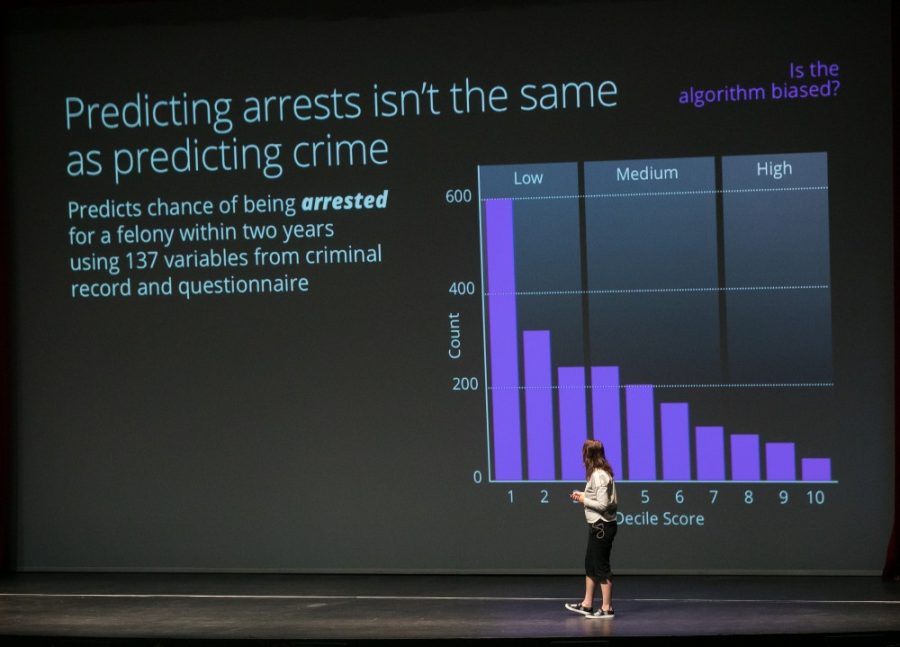For the 14th year, the University of Arizona’s College of Science will present a free two-month lecture series to the public. This year’s theme is “Searching for Certainty,” and the lectures will be held Tuesdays at 7 p.m. in Centennial Hall.
The set of six lectures will focus on exploring debates in the scientific community and sharing some of the discoveries coming from the UA, according to UA College of Science Dean Joaquin Ruiz.
“Now more than ever, it’s important that we talk about the processes and methods that scientists apply to their findings and research,” Ruiz said.
“Our lecturers this year from across scientific disciplines will share how the scientific community engages in this rigorous process.”
Bo Baylor, director of special projects for UA Science, said themes are chosen based on what a committee sees to be compelling and current stories developing in science, but this year was a little bit different — they started by choosing the speaker lineup.
RELATED: College friends become ‘blood brothers’ after one receives kidney donation from other
This year, every speaker has spoken in a previous year’s lecture series and they were identified as “fan favorites”, Baylor said.
“We ended up with this phenomenal group of scientists from all across broad areas of scientific research and study, from evolutionary biology to astronomy to geosciences to medicine,” Baylor said.
“We sat down and talked about their research, what they do and especially how they do it, how it impacts their lives — how science actually happens. And this thread started to emerge about what scientific discovery really means.”
That thread of shared truth wove the diverse group of scientists together.
“One universal thing that all of these scientists have in common is their continuing search for knowledge and for scientific truth — in essence, a search for certainty,” Baylor said.
According to Baylor, the UA Science Lecture Series is a “remarkable opportunity” to learn directly from some of the leaders in science, regardless of education level or background.
“You don’t have to be a scientist to understand science and its impacts on each of us. Science shapes and governs all of our lives — from the ways we interact with each other and the processes that make our bodies function, to the debates around some of today’s most contentious political issues,” Baylor said.
RELATED: ASUA votes to fund Campus Closet and swear in new senator (ASUA Notebook 12/5/18)
“Science is all around us, whether or not we consider ourselves to be ‘scientists.’”
The first lecture, held Jan. 15, will be called “There Is No Certainty.” Given by Joanna Masel, a UA professor of ecology and evolutionary biology, the lecture will contrast a randomized experiment with mining big data, as well as natural human discomfort with uncertainty.
“Understanding the Unseen Universe” will follow Jan. 22, and Feryal Özel, a professor of astronomy and physics, will explain how astronomers gather knowledge of phenomenon in space that can’t be directly observed.
Jan. 29, Joellen Russell, associate professor of geosciences, will share her experience as an oceanographer using robots to measure climate in “Climate and the Deep Blue Sea.”
Next up is Donata Vercelli, professor of cellular and molecular medicine, on Feb. 12. Vercelli will explore how microbes are sometimes misunderstood in “The Microbes Shaping Our Lives.”
The fifth lecture will be Feb. 19.
In “The Mind-Body Dialogue,” Katalin Gothard, a professor of physiology and neuroscience, will share how changes in the body can affect the brain and how understanding biological signals can be used to understand health and disease.
Feb. 26, Anna Dornhaus, a professor of ecology and evolutionary biology, will present “Can Intelligence Be Measured?” and discuss if intelligence should be seen as a set of independent problem-solving modules or as a singular, generalized skill of innovation, according to the UA Science Lecture Series website.
There is an added component to the lectures this year as well, in the form of shared video podcasts of the special educators’ courses, led by John Pollard, assistant dean in the Honors College.
RELATED: UA sends student regent finalists to governor
“[In the courses] local teachers meet with the series’ speakers to ask in-depth questions about each lecture and share ideas about how to apply learning from the Lecture Series in their own classrooms,” Baylor said.
This year, the lecture series is funded by the UA Office for Research, Discovery and Innovation, Tucson Electric Power, the Agnese Nelms Haury Program in Environment and Social Justice, the Arizona Daily Star, Canyon Ranch, Cox Communications, the Galileo Circle, Godat Design, Holualoa Companies, the Marshall Foundation, Nguyen & Tarbet Patent Law, Raytheon, the Research Corporation for Science Advancement, Tech Launch Arizona, the UA Honors College and Visit Tucson, according to the College of Science’s website.
In the past, Baylor said lectures have filled Centennial Hall to capacity, but luckily there is overflow seating available and technology has also helped expand the lectures’ audience.
“Thanks to Arizona Public Media, the livestreams go out to thousands of people across Tucson and the rest of the world,” Baylor said. “We hope to continue to expand that audience this year — but across all of our past YouTube videos and podcast views, more than half a million people have seen one of our lectures in the last five years alone.”
Centennial Hall is located at 1020 E. University Bvld. While the lectures are free, parking for a fee is available in Tyndall Avenue Garage at 880 E. 4th St. Additionally, lectures will be livestreamed by Arizona Public Media and will be available as a podcast or video on iTunes U, YouTube and Arizona Public Media.
Follow Marissa on Twitter















